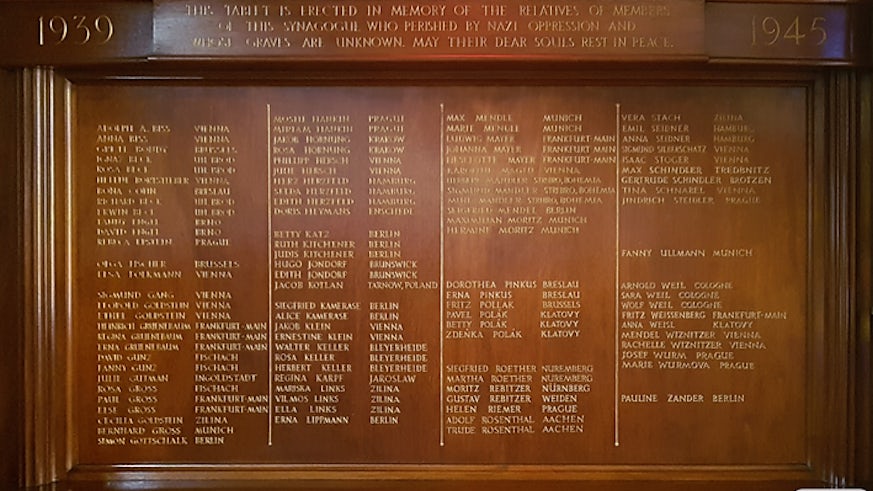Every life counts: Bearing witness to the Holocaust in South Wales
11 November 2021

Cardiff Synagogue memorial tablet research sheds light on 100 Jewish victims linked to Welsh capital
The lives of more than 100 people with links to Cardiff who died in the Holocaust are being remembered thanks to the painstaking work of volunteers in the Holocaust Memorial Tablet.
Part of the Framing Jewish Histories project, the research is inspired by a memorial tablet in Cardiff’s Reform Synagogue, first erected with 54 names in 1954, and later renovated with a further 48 names added in 1999.
Each of the 102 men, women and children named on the wooden plaque were related to members of the Cardiff congregation. All perished in the Holocaust.
Klavdija Erzen, who managed the project for the Jewish History Association of South Wales/ Cymdeithas Hanes Iddewig De Cymru (JHASW/CHIDC), explained:
“Many of the original sponsors of the Memorial Tablet have since died or moved away from Cardiff, and little was known about many of the people listed. These are not simply names; they are mothers and fathers, sons and daughters, brothers and sisters. Their lives deserve to be remembered, just as their deaths are commemorated.”
The association began the initiative to research every name to mark each life with a permanent record in 2019, detailed in its 2021 Holocaust memorial film.
The team of volunteers researched each name, revealing a narrative for the majority of those listed through research crisscrossing Europe and beyond. Two students from the School of History, Archaeology and Religion gave just shy of 200 hours to the project, contributing to the complex research needed to tell each person’s story.
One such couple is Otto and Grete Bondy, who married and lived in Vienna. Following the Anschluss and the enforced takeover of their business into Aryan hands, the Jewish couple succeeding in fleeing to Belgium taking different routes with their adolescent children Liese and Walter. In Belgium, Otto and Grete’s brother were arrested but managed to flee an internment camp in France and return to their families. But their luck didn’t hold, despite periods of being hidden by the mother of one of Walter’s friends. Otto and Grete were arrested at their home by the Gestapo in 1943. Liese and Walter were not at home and escaped capture, remaining in hiding.
A four-hour train journey to Holland became 1,200km. Along the route, they managed to throw postcards from the train to reassure their families while safeguarding their children’s hiding place.
Two days later they arrived at their final destination, Auschwitz-Birkenau. Of the 1,425 Jews – men, women and children - on their transport, 875 were murdered on arrival in the gas chambers and 550 were sent to forced labour. Only 31 people from Transports XX11 A & B survived the war. There is no record of Otto and Grete making it beyond arrival.
Grete’s sister survived the Holocaust and moved to Cardiff after the war, participating actively in the Reform synagogue and raising a family, including adopting Grete’s daughter who had survived by hiding in a convent.
The full version of this story, written by the Jewish History Association of South Wales/Cymdeithas Hanes Iddewig De Cymru, is available online.
Lecturer in Modern Jewish History at the School of History, Archaeology and Religion, Dr Jaclyn Granick said:
‘This project allows us to remember Cardiff’s history as a place of refuge from genocide, but also with complex links to genocide itself. Jews in Cardiff experienced trauma from the Holocaust, to which this memorial tablet attests.
This detailed research brings that privately held, gaping loss to public attention at last, demonstrating that the Holocaust didn’t entirely happen “over there,” but impacted Cardiffians personally and changed the history of Cardiff itself.’
The narratives of all those researched can be followed on the project’s Memorial Tablet website, launched on 9th November, the anniversary of a series of pogroms in 1938 against Jews in German territory known today as Kristallnacht.
Framing Jewish Histories project was funded by the National Lottery Heritage Fund, Jewish Historical Society of England, Cardiff University, and Jewish Memorial Council.
Established in 2018, The Jewish History Association of South Wales/Cymdeithas Hanes Iddewig De Cymru aims to uncover, document, preserve, and share the tangible and intangible cultural heritage of the Jewish communities of south Wales.
Dr Jaclyn Granick works at the intersection of modern Jewish history and international history, especially in the late 19th to 20th centuries, with particular focus on politics, philanthropy, humanitarianism and gender across the Jewish Diaspora.
